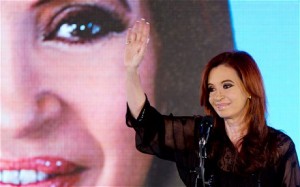Cristina Fernández de Kirchner Wins Re-election by a Landslide
On October 23, 2011, Argentine President Cristina Fernández de Kirchner was re-elected by one of the widest margins in the country’s history. Sra. de Kirchner obtained fifty-four percent of the votes while her challenger, socialist Hermes Binner, acquired just seventeen percent. The provincial elections also confirmed the victory of Kirchner’s Peronist coalition; seven of eight governors were elected from the ranks of the ruling Frente para la Victoria.
Ultimately, the opposition had hobbled itself by failing to unite behind a single candidate. Rivals like Eduardo Duhalde, a dissident Peronist, and Ricardo Alfonsín, member of the Radical Civil Union, divided the anti-Kirchner vote. The most likely successful candidate would have been Mauricio Macri, leader of the center-right, had he not declined to run. Macri is probably working up to the 2015 election, for which Kirchner will no longer be able to run due to constitutional rules that do not permit a president to exceed more than two consecutive terms.
Kirchner’s successful re-election has been mainly due to economic growth under her administration, and this year alone, the growth rate is expected to increase to eight percent. This upward trend was stimulated in part by private consumption and investment, as well as the devaluation of the Argentinepeso, which makes Argentine exports more competitive in foreign markets. Since Argentina defaulted on USD 95 billion of debt nine years ago, the economy has done remarkably well. From 2002-2011, according to IMF data, Argentina’s economy has grown by about ninety-four percent, the fastest economic growth rate in the Western Hemisphere.
In the international arena, Kirchner renewed contact with the IMF that Néstor Kirchner had previously broke off, and debt negotiations with the Paris Club, an informal group that provides financial services. The Kirchner administration also instituted subsidies for transport and utilities and introduced several social programs. One such program provides a monthly per-child economic subsidy to families of which parents are unemployed or work in the informal sector. This stipend is contingent on children’s regular school attendance, vaccinations, and health checkups. The Kirchner welfare policy has generally been a success, reducing extreme poverty and increasing employment to record levels.
However, critics of Kirchner contend that the economy is only booming due to high commodity prices and strong demand from China and Brazil, factors that may be undermined by a potential global economic downturn. In addition, political opponents of Kirchner have repeatedly accused her government of tampering with economic statistics. Argentina’s official annual inflation rate is nine percent; however, the IMF and other economists suggest that the true rate is three times as high. Critics also say that Kirchner has not been able to attract foreign investment. In fact, according to the United Nations Economic Commission for Latin America, Argentina receives relatively little foreign direct investment, lagging behind Colombia and Peru and receiving less than half the amount flowing into Chile.
In her victory speech on Sunday, October 23, 2011 in Plaza De Mayo, Kirchner said that she wanted to continue fostering Argentina’s strong growth: “All I want is to keep collaborating…to keep Argentina growing. I want to keep changing history.” She also mentioned her husband, stating, “This is a strange night for me; this man who transformed Argentina led us all and gave everything he had and more. Without him, without his valor and courage, it would have been impossible to get to this point.”
Despite the economic progress under the Kirchner administrations, a great deal remains to be done to reduce the existing gap between a rich minority and an impoverished majority and to reduce the high inflation. If Kirchner now wants to enable a durable and robust growth in Argentina, she must act to ensure the diversification of productive activities, as has transpired in Brazil and Chile. Similar to what happened in Chile with its exploitation of copper, the excessive dependence on the exploitation of raw materials could prevent Buenos Aires from breaking free of the so-called “resource curse” and prevent it from flying.
This analysis was prepared by COHA Research Associate Sara Bruzichis


